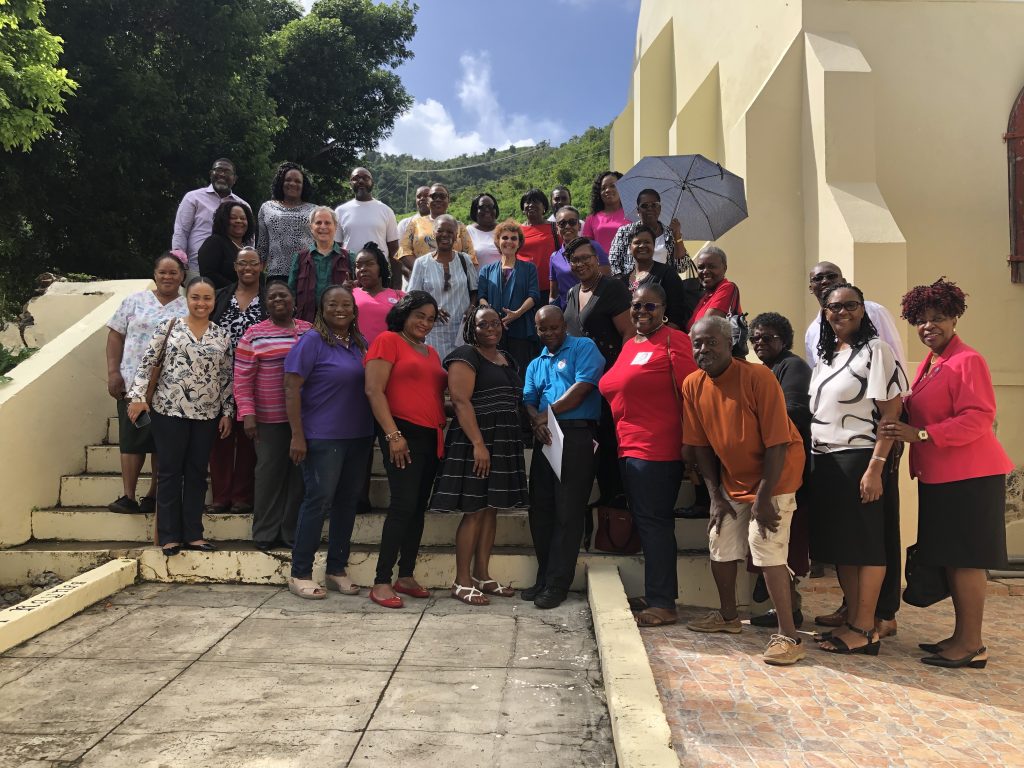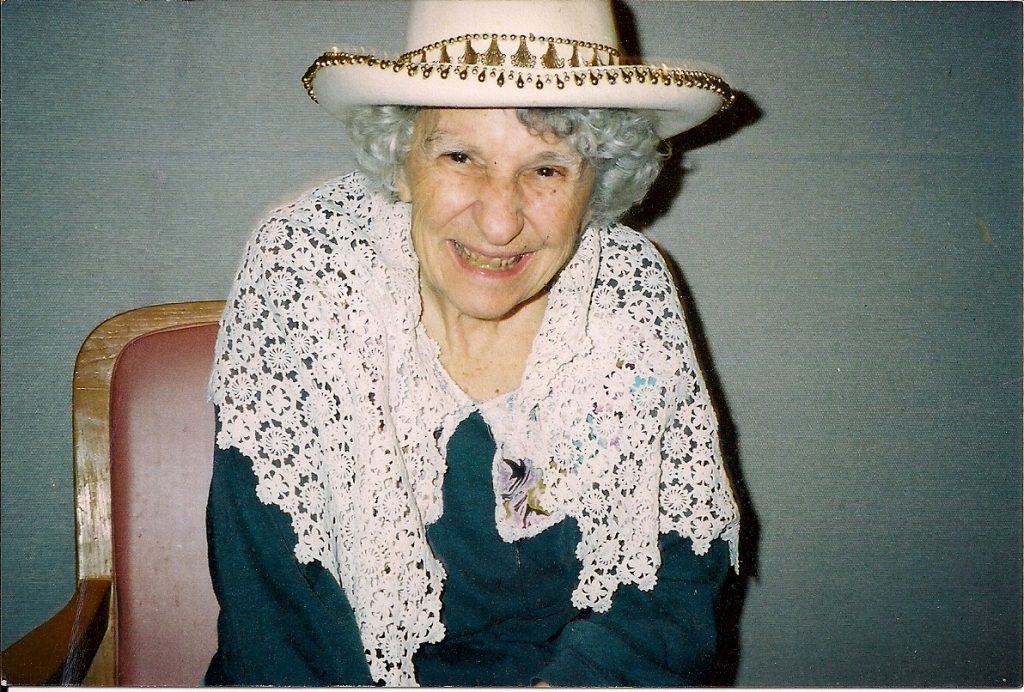Spirituality
Presenting to Care Partners in Tortola: The Power of One Person to Make a Difference
The founding of the Virgin Islands Alzheimer’s Association in Tortola, BVI, is about the power of one person to make a difference. It started at a Rotary Club meeting in 2013 when a fellow Rotarian confided in Edna Williams, “I have been diagnosed with Alzheimer’s.”
He told her how hard it was to find support and resources. Edna felt compassion for her friend and others in his situation. As a trained social services worker, human resources consultant, and woman of action, she went to work to remedy the situation. The results: a vibrant Association recognized by Alzheimer’s Disease International. The Association and its many volunteers serve as advocates for people who are living with dementia and their friends and families.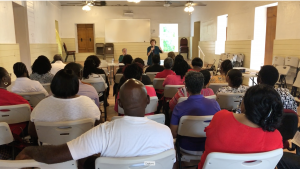
We were honored to spend time with Edna and to share our presentation with a group of family and professional care partners, social workers, and community and spiritual leaders. As we talked about the strength of music to keep us connected, Dawn, the daughter of Edna’s Rotarian colleague, the man who had inspired the founding of the Association, stepped forward to tell us her own story.
For several years, her father had been listless and withdrawn, seldom showing interest in anything. She mourned his father’s dynamic personality and tried many things to lift his spirits and pique his interest. Then she came upon a favorite song of his from years back, a lively tune with a Latin beat.
“When I played that song for him,” she told us, “he came to life. His eyes brightened and he began to mouth, then sing the words. He leaned forward in his chair, wanting to get up and move. It was such a meaningful transformation. The music connected with him and that helped him connect with us.”
Her touching story was a reminder that arts and creativity can go beyond the rational mind and the spoken word and awaken our hearts and spirits.
As we shared ideas for staying connected with each other, regardless of our abilities, our own hearts and spirits were expanded by our time with Edna and her group. It’s wonderful to live in a place of breathtaking beauty. It’s even greater to live in a community where people reach out to help and support their neighbors.
An Old-Fashioned Holiday
This old-fashioned holiday story from Love in the Land of Dementia: Finding Hope in the Caregiver’s Journey celebrates the spiritual aspects of living with dementia.
When I walk through the doors of the nursing home, I find my mother in her wheelchair, right in front of the medication cart, right behind the central nursing station, where nurses, delivery people, staff and family members congregate. Mom is bent over, her baby doll lying across her lap. When I walk up to her, I ratchet up my energy and widen my smile. I am preparing to clown her into a reaction.
Later my father will ask if I think she recognized me.
“No,” I will have to tell him. “She did not recognize me. But she did smile.”
The smile is important.
My hand waving and head bobbing does its work: Mom does smile, and I can tell she is in her own current version of a good mood.
“Music in the dining room,” the activity board reads, so I wheel her in that direction. An elderly man with a red and white trimmed Santa hat passes us in the hallway.
“Look Mom, there’s Santa,” I tell her.
Having been brought up Jewish, Mom never was all that enthralled with the Claus mythology and she has not changed.
A white-haired woman is in the dining room, busily setting up for the music program. Several patients are already gathered. The woman takes out a microphone, a boom box, an illuminated plastic snowman, and a small silver bell. I continue wheeling Mom down the far corridor, liking the sense of companionship I have from this movement.
As we stroll, a nurse carrying a plate of lettuce walks past us.
“She must have been a good mother,” she says, nodding at the way Mom is holding the baby. “She must still be a good mother.”
“She is,” I say.
I have never really said to my mom, “You were a good mother.”
Now I realize she was.
I can see that Mom is enjoying the ride. She loved movement when she was younger and was far more adventuresome than Dad when it came to airplanes, ski lifts, fast cars, and speedy boats. For her, biting breeze across the face was thrilling, not threatening. Until she became a mother, that is. Then she abandoned her pleasure in the heights and speed and concentrated on making sure we were slow, safe, and centered.
We roll back into the dining room just as the show is ready to start. The singer, Thelda, kicks off her shoes and presses play on the boom box. Above the cheerful sound track, she sings Jingle Bells. She dances across the room with the remnants of ballroom steps. She stops in front of Mom and sings right to her. She gets on her knees, so she can look into Mom’s eyes, and keeps singing. Mom notices her and smiles a little.
Thelda moves on, singing to each of the patients gathered around, so intent on making a connection that she often forgets the words.
“Is it all right for your Mom to come to Christmas holiday events?” the activity director had asked me, when Mom moved from the memory care into the skilled care portion of the nursing home.
“Yes, I’d like her to go to any activities. She likes the extra energy.”
I think Mom would approve of my decision, even though she has never celebrated Christmas. Growing up, her immigrant mother held on to the Jewish spirit of her home, kneading dough for Friday evening challah, observing each holiday and prayer period in her own way. Some orthodox women followed the religious law that commanded a small piece of the dough be burned as an offering to God. My grandmother was poor; she did not believe in burning good food, regardless of tradition. So she sacrificed a portion of the dough to her youngest daughter, my mother Fran. She created a “bread tail,” leftover dough that she smeared with butter and sprinkled with sugar and baked. When Mom used to talk about her mother, she always mentioned this special treat.
Even when I was growing up, and we were the only Jewish family in our neighborhood, my mother still did not sing Christmas songs. She did not willingly go to Christmas parties. She let the holiday rush by her, like a large train, whooshing past, ruffling her hair and leaving her behind.
Now, I am singing Christmas carols to my Mom for the first time. She is smiling, though really not at me. But I am sitting beside her while she is smiling and that makes me happy. She has moved beyond the place where the religions are different, beyond the place where she wants to separate the dough and make a sacrifice for tradition. Her new tradition is anyone who can make her smile.
With each song, from White Christmas, to Silver Bells, to Frosty the Snowman, Thelda moves back to Mom, tapping her, nudging her, shaking a bell almost in her face, acting sillier and sillier. Each time, Mom lifts her head and widens her mouth for a second.
For her finale, Thelda puts on a big red nose and sings Rudolph. When she dances in front of Mom with that nose, Mom laughs. For several minutes, Mom stays fixated on the scarlet nose, her face a miracle in pure enjoyment. I laugh too, so delighted to see Mom engaged and absorbed. Then, Thelda dances away and Mom’s face glazes back over.
Two weeks from now, I will bring a menorah and candles into my mother’s room. My father and I will have a short Chanukah ceremony with Mom. She will pick at the shiny paper covering the Chanukah gelt (chocolate candy disguised as money). She will slump over in her chair. But she will come back to life when she sees me, her only daughter, wearing a big red nose as I light the menorah.
Deborah Shouse is the author of Connecting in the Land of Dementia: Creative Activities to Explore Together and Love in the Land of Dementia: Finding Hope in the Caregiver’s Journey.
My Mom’s New Holiday Tradition: Smiling
**
We roll into the memory care facility’s dining room just as the show is ready to start. The singer, Thelda, kicks off her shoes and presses play on the boom box. Above the cheerful sound track, she sings Jingle Bells. She dances across the room with the remnants of ballroom steps. She stops in front of Mom and sings right to her. She gets on her knees, so she can look into Mom’s eyes, and keeps singing. Mom notices her and smiles a little.
Thelda moves on, singing to each of the patients gathered around, so intent on making a connection that she often forgets the words.
“Is it all right for your Mom to come to Christmas holiday events?” the activity director had asked me, when Mom moved in.
“Yes, I’d like her to go to any activities. She likes the extra energy.”
I think Mom would approve of my decision, even though she has never celebrated Christmas. Growing up, her immigrant mother held on to the Jewish spirit of her home, kneading dough for Friday evening challah, observing each holiday and prayer period in her own way. Some orthodox women followed the religious law that commanded a small piece of the dough be burned as an offering to God. My grandmother was poor; she did not believe in burning good food, regardless of tradition. So she sacrificed a portion of the dough to her youngest daughter, my mother Fran. She created a “bread tail,” leftover dough that she baked, then smeared with butter and sprinkled with sugar . When Mom used to talk about her mother, she always mentioned this special treat.
Even when I was growing up, and we were the only Jewish family in our neighborhood, my mother still did not sing Christmas song. She let the holiday rush by her, like a large train, whooshing past and leaving her behind.
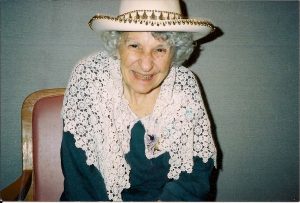 Now, I am singing Christmas carols to my Mom for the first time and she is smiling. She has moved beyond the place where the religions are different, beyond the place where she wants to separate the dough and make a sacrifice for tradition. Her new tradition is anyone who can make her smile.
Now, I am singing Christmas carols to my Mom for the first time and she is smiling. She has moved beyond the place where the religions are different, beyond the place where she wants to separate the dough and make a sacrifice for tradition. Her new tradition is anyone who can make her smile.
With each song, from White Christmas, to Silver Bells, to Frosty the Snowman, Thelda moves back to Mom, tapping her, acting sillier and sillier. Each time, Mom lifts her head and widens her mouth for a second.
For her finale, Thelda puts on a big red nose and sings Rudolph. When she dances in front of Mom with that scarlet nose, Mom laughs, her face a miracle in pure enjoyment. I laugh too, so delighted to see Mom engaged and absorbed.
Two weeks from now, I will bring a menorah and candles into my mother’s room. My father and I will have a short Chanukah ceremony with Mom. She will pick at the shiny paper covering the Chanukah gelt (chocolate candy disguised as money). She will slump over in her chair. But she will come back to life when she sees me, her only daughter, wearing a big red nose as I light the menorah.Here’s to a meaningful and fun holiday season.
I look forward to connecting with you when I resume blogging in early January.
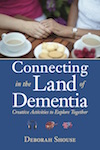
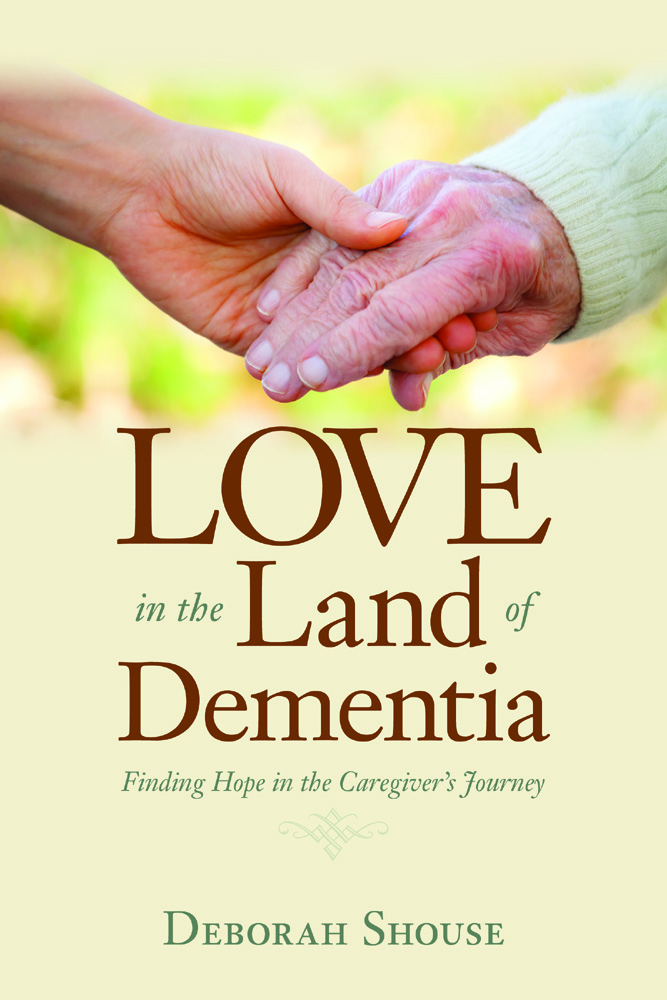
An Old-Fashioned Holiday
This holiday story from Love in the Land of Dementia: Finding Hope in the Caregiver’s Journey celebrates the spiritual aspects of living with dementia.
When I walk through the doors of the nursing home, I find my mother in her wheelchair, right in front of the medication cart, right behind the central nursing station, where nurses, delivery people, staff and family members congregate. Mom is bent over, her baby doll lying across her lap. When I walk up to her, I ratchet up my energy and widen my smile. I am preparing to clown her into a reaction.
Later my father will ask if I think she recognized me.
“No,” I will have to tell him. “She did not recognize me. But she did smile.”
The smile is important.
My hand waving and head bobbing does its work: Mom does smile, and I can tell she is in her own current version of a good mood.
“Music in the dining room,” the activity board reads, so I wheel her in that direction. An elderly man with a red and white trimmed Santa hat passes us in the hallway.
“Look Mom, there’s Santa,” I tell her.
Having been brought up Jewish, Mom never was all that enthralled with the Claus mythology and she has not changed.
A white-haired woman is in the dining room, busily setting up for the music program. Several patients are already gathered. The woman takes out a microphone, a boom box, an illuminated plastic snowman, and a small silver bell. I continue wheeling Mom down the far corridor, liking the sense of companionship I have from this movement.
As we stroll, a nurse carrying a plate of lettuce walks past us.
“She must have been a good mother,” she says, nodding at the way Mom is holding the baby. “She must still be a good mother.”
“She is,” I say.
I have never really said to my mom, “You were a good mother.”
Now I realize she was.
I can see that Mom is enjoying the ride. She loved movement when she was younger and was far more adventuresome than Dad when it came to airplanes, ski lifts, fast cars, and speedy boats. For her, biting breeze across the face was thrilling, not threatening. Until she became a mother, that is. Then she abandoned her pleasure in the heights and speed and concentrated on making sure we were slow, safe, and centered.
We roll back into the dining room just as the show is ready to start. The singer, Thelda, kicks off her shoes and presses play on the boom box. Above the cheerful sound track, she sings Jingle Bells. She dances across the room with the remnants of ballroom steps. She stops in front of Mom and sings right to her. She gets on her knees, so she can look into Mom’s eyes, and keeps singing. Mom notices her and smiles a little.
Thelda moves on, singing to each of the patients gathered around, so intent on making a connection that she often forgets the words.
“Is it all right for your Mom to come to Christmas holiday events?” the activity director had asked me, when Mom moved from the memory care into the skilled care portion of the nursing home.
“Yes, I’d like her to go to any activities. She likes the extra energy.”
I think Mom would approve of my decision, even though she has never celebrated Christmas. Growing up, her immigrant mother held on to the Jewish spirit of her home, kneading dough for Friday evening challah, observing each holiday and prayer period in her own way. Some orthodox women followed the religious law that commanded a small piece of the dough be burned as an offering to God. My grandmother was poor; she did not believe in burning good food, regardless of tradition. So she sacrificed a portion of the dough to her youngest daughter, my mother Fran. She created a “bread tail,” leftover dough that she smeared with butter and sprinkled with sugar and baked. When Mom used to talk about her mother, she always mentioned this special treat.
Even when I was growing up, and we were the only Jewish family in our neighborhood, my mother still did not sing Christmas songs. She did not willingly go to Christmas parties. She let the holiday rush by her, like a large train, whooshing past, ruffling her hair and leaving her behind.
Now, I am singing Christmas carols to my Mom for the first time. She is smiling, though really not at me. But I am sitting beside her while she is smiling and that makes me happy. She has moved beyond the place where the religions are different, beyond the place where she wants to separate the dough and make a sacrifice for tradition. Her new tradition is anyone who can make her smile.
With each song, from White Christmas, to Silver Bells, to Frosty the Snowman, Thelda moves back to Mom, tapping her, nudging her, shaking a bell almost in her face, acting sillier and sillier. Each time, Mom lifts her head and widens her mouth for a second.
For her finale, Thelda puts on a big red nose and sings Rudolph. When she dances in front of Mom with that nose, Mom laughs. For several minutes, Mom stays fixated on the scarlet nose, her face a miracle in pure enjoyment. I laugh too, so delighted to see Mom engaged and absorbed. Then, Thelda dances away and Mom’s face glazes back over.
Two weeks from now, I will bring a menorah and candles into my mother’s room. My father and I will have a short Chanukah ceremony with Mom. She will pick at the shiny paper covering the Chanukah gelt (chocolate candy disguised as money). She will slump over in her chair. But she will come back to life when she sees me, her only daughter, wearing a big red nose as I light the menorah.
Deborah Shouse is the author of Love in the Land of Dementia: Finding Hope in the Caregiver’s Journey.
Three Star-Studded Tips: The Creativity of Being a Care Partner
“For my part I know nothing with any certainty, but the sight of the stars makes me dream.” Vincent Van Gogh
Several years ago, we spent an evening in Zion National Park in Utah looking for shooting stars.
“There’s one,” someone said.
“I see it!” someone else said.
I saw only the regular stars, which were also gorgeous but not quite as exciting.
“I can’t see any shooting stars,” I finally confessed.
“Here’s how you spot a shooting star,” our friend Ron told me. “You soften and widen your gaze and stare off into the middle distance. You’re looking at everything and nothing. That way you’re open to that sudden flash of light and movement.”
I didn’t see the flash of light from a shooting star that evening, but I did have an idea flash. Looking for shooting stars is like inviting out creativity. You open up your focus, relax, put yourself in receiving, daydreaming mode and wait for something marvelous.
For me, the art of being a care partner was an exceedingly creative endeavor. Much of the time was fraught with focus, dedicated to detail. But when I remembered to soften and widen my gaze, I was able to see my mom for the star she was, even when she seemed light years away from me.
Here are some tips for your own personal “star-gazing:”
Sit quietly with the person living with dementia. If appropriate, hold hands.
Let go of your history and your expectations. Appreciate her just as she is.
Open your mind and heart: be receptive to whatever flashes of light may come your way. Be happy even if you think nothing particular has happened.
For me, this was a rich way to connect with Mom when she was without words. Just sitting still renewed me, and ideas and memories often bubbled up.
Deborah Shouse is the author of Love in the Land of Dementia: Finding Hope in the Caregiver’s Journey.
Trusting The Loss Of Your Identity
I met Mary O’Malley when I interviewed her for an article in Natural Awakenings Magazine. She inspired me then and she continues to inspire me. I am honored to share an abridged version of her post with you.
Trusting The Loss Of Your Identity
From Guest Blogger Mary O’Malley, author of What’s In the Way IS the Way
A friend of mine lost her husband about a year ago. She was his caretaker for many years, and before that, she cared for her ailing parents. She feels like she doesn’t know who she is anymore and is trying to figure out what she is supposed to be doing next. She feels like her identity has been taken away. I believe just the opposite is happening. Life has taken away the caretaker role so she can get to know who she really is.
I too have experienced what it is like to have the old identity ripped away. It feels like a butterfly whose wings are wet and cannot move. Often times our self-worth is tied to how much we accomplish or how much we can get done. When part of our identity is taken away from us, it is painful and scary. And our poor little mind goes crazy because it has always found a sense of safety through the illusion that it is in control. The mind is a tool for maneuvering through reality, but it is not reality.
I believe Life is preparing us for being birthed back into the vast spaciousness of who we truly are. But, it can be confusing and scary for the ego. As the Tibetan Lama Chögyam Trungpa Rinoche says, “If there were no confusion, there would be no wisdom. Chaos should be regarded as really good news.” When we lose a part of our old identify, there can be so much confusion and grief that it feels like death. But, actually something new is being born. Remember that, although birth is wonderful, it is not neat and pretty. A human birth has pee and poop and blood, and it is painful. So it is important to do our Lamaze breathing, whether we are birthing a child or Life is birthing us! We can resist this process, or we can recognize that Life knows what it is doing as it takes this away and that away.
The next time you feel challenged, try asking Life for help by saying, “Help me through this passage, and show me how to see what you are showing me so I can be healed to my core.”
To read the entire blog, visit: http://www.maryomalley.com/2015/04/05/trusting-the-loss-of-your-identity-2/
To be further inspired by Mary and her work, visit: http://www.maryomalley.com/books/
Deborah Shouse is the author of Love in the Land of Dementia: Finding Hope in the Caregiver’s Journey.
Stepping into the Care Partner’s Journey: Creating the Path
 It was 4:00 am and Carlos and Luis, our Ecuadorian guides, waited patiently by the dugout canoe. It was a half-hour boat ride and an hour trek to the salt lick where the wild parakeets descended early every morning. Carlos had described the cacophony of sound and the brilliant flashes of yellow that blotted out the sky when the birds arrived and Ron and I were eager to be part of the experience. The morning was silent save for the paddles pushing through the still waters. When we reached the land, Carlos tied the canoe to a thorn tree and Luis helped us out of the boat. In the dim light, I headed toward what looked like the only opening into the brush. But Carlos stopped me.
It was 4:00 am and Carlos and Luis, our Ecuadorian guides, waited patiently by the dugout canoe. It was a half-hour boat ride and an hour trek to the salt lick where the wild parakeets descended early every morning. Carlos had described the cacophony of sound and the brilliant flashes of yellow that blotted out the sky when the birds arrived and Ron and I were eager to be part of the experience. The morning was silent save for the paddles pushing through the still waters. When we reached the land, Carlos tied the canoe to a thorn tree and Luis helped us out of the boat. In the dim light, I headed toward what looked like the only opening into the brush. But Carlos stopped me.
“Deborah, you’re heading in the wrong direction,” he said. He held up his machete and pointed to a tangle of vines and trees off to the left. “This is our trail.” And he and Luis began creating a path through the jungle.
Recently, my friend Janet Sunderland shared this Joseph Campbell quote: “If you can see your path laid out in front of you step by step, you know it’s not your path. Your own path you make with every step you take. That’s why it’s your path.”
So many times during my time with my mother, I was drawn to those bright openings, the beautiful array of well-worn steps. All too soon, I would be reminded by an inner or outer voice, “Deborah, you are heading in the wrong direction.” And I was guided back to the core of my care partnering journey, the intense creativity of the path-in-progress, step by step, creating a trail only I could make.
 Deborah Shouse is the author of Love in the Land of Dementia: Finding Hope in the Caregiver’s Journey.
Deborah Shouse is the author of Love in the Land of Dementia: Finding Hope in the Caregiver’s Journey.
Let it Be: A Recipe for Counting Blessings
I wanted to share this story from Love in the Land of Dementia, a tribute to my mother and her beautiful capacity for wisdom. Here’s to embracing the divine flow of life.
Let It Be
For the first time, my mother cannot really help prepare our Seder meal. She wanders around the kitchen, pausing at the counter, the stove, the table as if to collect something lost.
“What was I doing?” she asks.
“Setting the table,” I say.
“How many people are coming?”
“Ten,” I say, spilling the spoonful of oil in my irritation. An old football cheer floats into my mind, “First and ten, do it again. Do it again.” And again. Mom has already asked me these questions several times in the last 10 minutes.
When Mom and Dad drove up two days ago, Dad’s face was tight and he went straight to the guestroom to take a nap.
“Sometimes I wish I were hard of hearing,” he told me, later that evening.
Mom’s speech is like an old record player with a needle that refuses to leave its groove. The simple anchors of life, the who, what, where, and when of things, often elude her.
“Did you remember the macaroons for dessert?” she asks, a fork in hand.
“Yes,” I say, again. I crack an egg and have to scoop shell out of the bowl.
I stir the matzo mixture and take a breath. I have trained myself to be brisk and efficient, but now, around my mother, I need to be slow and soft.
“How many people are coming?” she asks.
“Ten,” I say, impatience pinching my throat. “Let’s take a break and go for a walk.”
I wipe my hands and look for the house keys. They are not on their usual hook in the cabinet. They are not in my purse, or lolling on the kitchen table. I feel a brief flutter of shame over the impatience I felt just this morning, when Mom misplaced her glasses case for the second time. Then I feel a stab of fear: am I too losing my mind?
“Have you seen my keys?” I ask my daughter, who comes breezing through, searching for chocolate to inspire her mid-term studying.
She stops, Hershey’s bar in hand. “They’re right in front of you, Mom,” she says, pointing to a huddled mass of metal on the counter corner. I pocket the keys and double check to make sure I have turned off the stove.
Outside, the redbuds are flowering; the dogwoods skirting newly green lawns. My mother and I walk past a closed-down lemonade stand, three broken lawn chairs,set out on the curb, and a blond, floppy-haired girl, skipping over a pink jump rope.
“It was hard when my mother died. My father just disappeared, took off walking,” Mom says. “He was a good man, though.”
I nod. I remember as much about my mother’s childhood as I do my own. The story of her mother’s death is one in a series of memories Mom has told me all my life.
We pass a woman strolling a sleeping baby and Mom smiles.
“Did you get the macaroons?”
“Yes, I did Mom.”
“Did I already ask you that?”
“Yes.”
“Your father gets mad at me sometimes,” she says. “He thinks I’m forgetting on purpose.”
“What’s it like to not remember?” I ask.
An eager black spaniel rushes up to us.
“I start a thought,” Mom says, bending to pat the dog, “and the end disappears. If I try too hard to catch it, that makes it worse. So I let go, and eventually I get the answer. Of course, by that time, something else is going on.” Mom smiles and shakes her head. Her hair is silvery and curly; her hands like fine dried flowers; her stride crisp and full.
All weekend, I have watched her happily listen to the conversations around her, passionately asking a question, then moments later, equally passionate, asking the same question. I have listened to her stories, which have the comforting familiarity of a well-worn quilt. These stories, which sprinkled my growing-up years, are now the major part of our conversations.
That evening, we celebrate Passover with a Seder service. As the service progresses, my father tells our guests about “Dayenu,” a Hebrew word that means, “Even that would have been enough.”
“It sounds like Die-aa-nu,” he says. “You repeat it after each of the sentences I’m going to read. It’s a way of expressing gratitude.”
My mother fiddles with the prayer book and asks for the third time, “Is it time for Elijah?”
“Not yet,” my father says, his voice tense. Then he calms and begins the Dayenu litany:
“If God had divided the sea without leading us onto dry land,”
“Dayenu,” we all repeat.
“If God had taken care of us in the desert for 40 years without feeding us manna,”
Dayenu.
“If God had fed us manna without…”
And so we follow the journey of our ancestors, promising we will be satisfied. With whatever we get.
As I repeat my gratitude and pledge my satisfaction with life as it is I think of my mother. I miss her remembering all the details of my life. I miss her knowing where the silverware drawer is. I miss telling her something I’m proud of and having her remember it. And yet, she is the living symbol of Dayenu, graciously accepting her failing mind and making the best of it.
“And now, it’s time to eat,” my father says.
My mother reaches over and pats my wrist. I see the patina of softness that burnishes her, the loving core that goes far beyond mundane daily detail. I see the woman who has loved me even during the years I wandered through a difficult wilderness.
As we sip our sweet wine and break off a piece of unleavened bread, I create my own litany:
If my mother gets pleasure out of life. . .
Dayenu
If she remembers who I am. . .
Dayenu
“This is a lovely Seder,” she says. “You did a beautiful job of putting all this together.”
I press her hand, look into her smiling face and say, “Dayenu.”
Deborah Shouse is the author of Love in the Land of Dementia: Finding Hope in the Caregiver’s Journey.
Forget Control: Remember Breaking Through
Too many times, after I’d spend time with my mom, I’d come home and instantly misplace my car keys or forget a phone number. The panic rocketed through me, the fear almost knocking the breath out of me, and I’d think, “I’m losing my mind; it’s happening to me.”
I recently read an insightful and reassuring blog by Mary O’Malley, author of What’s in the Way Is the Way. Mary offers a creative and spiritual perspective on the concept of forgetfulness. Here are some excerpts from her work.
It’s a Breakthrough, Not a Breakdown
By Mary O’Malley
A friend of mine is struggling right now. He has been the caregiver for his spouse for quite a few years and lately, he often feels disoriented, confused, and has had trouble remembering things.
He said recently, “Mary, I think I am losing my mind.” He went to his primary care provider, but so far, all of his medical tests are negative. So, what is going on?
I believe that my friend is experiencing an initiation through fear. He thinks he is having a breakdown, but I call it a breakthrough. Losing our mind is one of our biggest fears. Most of us think our mind has been our safe place; we believe it needs to be on top of everything and in control. It has given us a false sense of security our whole lives. When we believe the mind is checking out or losing control, we have a hard time accepting it. But we are not in control; life is in control. We are all going to completely lose control at some point. Our bodies are going to break down. We are all going to die. And there is actually something inside of us that is totally okay with all of that. Life loves us enough to give us the exact set of experiences we need in order to become free from fear, including the experiences of confusion, disorientation, and memory loss.
Often we think we are in control, but are we? Are we in charge of our breathing? Some people would say, “Yes.” But just try to stop your breath. We can make it shallow or deep and we can hold our breath, but ultimately we are not in charge of our life force: We are being breathed by life. Stephen Levine, author, poet, and spiritual teacher, says, “May you be so lucky to come across something you can’t control.” This is where we find the healing.
The Tibetan Lama and founder of Naropa University, Chögyam Trungpa Rinpoche gets to the heart of what we are exploring here when he says: “If there were no confusion, there would be no wisdom….
Chaos is workable…not regressive.
Respect whatever happens, chaos should be regarded as extremely good news.
Respect the upsurge of energy that is emotions, no matter what form. … Let yourself be in the emotion, go through it, give-in to it, experience it….. Transmutation involves going through such fear.”
In other words, confusion is a necessary part of our spiritual awakening. What would your life be like if you trusted it all, even deep fear and confusion?
To read Mary’s entire blog, please visit: http://www.maryomalley.com/2014/12/07/its-a-breakthrough/
To learn more about Mary and her work, visit: http://www.maryomalley.com/
Deborah Shouse is the author of Love in the Land of Dementia: Finding Hope in the Caregiver’s Journey.
Stepping into Your Own Caregiving Pilgrimage
“For me there is only the traveling on paths that have heart…and the only worthwhile challenge is to traverse its full length–and there I travel looking, looking breathlessly.” Carlos Castaneda
I love this image of looking breathlessly: so many times during our pilgrimage through dementia with my mother and later with Ron’s parents, we had that spark of wonder and connection that transcended all else.
Of course, other times we felt like we’d lost the path and were disconnected from our creative selves. During such times of uncertainty and struggle, I like to seek out inspiring people. I recently had the privilege of interviewing two such women and I wanted to share the experience with you.
Please click here and join Maggie Finefrock and Lydia Smith on a fascinating spiritual pilgrimage. Then take their tips and create your own “everyday” pilgrimage.
“Your soul knows the geography of your destiny and the map of your future. Trust this side of yourself. It will take you where you need to go but it will also teach you a kindness of rhythm in your journey.” John O’Donohue Wisdom
Deborah Shouse is the author of Love in the Land of Dementia: Finding Hope in the Caregiver’s Journey.
